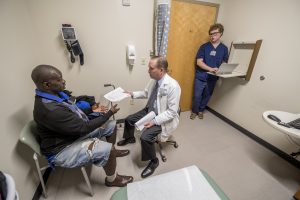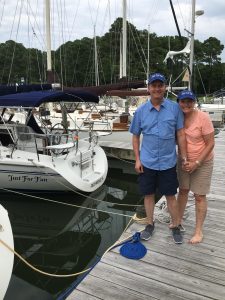Anton Kuzel, M.D., M.H.P.E., looks forward to celebrating the Department of Family Medicine and Population Health’s 50th anniversary in 2020.
Being around to lead a golden anniversary is not something Kuzel, professor and chair of the department for 15 years, necessarily imagined when he joined the faculty fresh out of residency in 1984. A Midwesterner at heart, he grew up and trained in Chicago (his office reflects his love of his hometown, with Bulls, Cubs and other sports memorabilia).

Pre-med student Joshua Rawson works as a scribe in the clinic of Tony Kuzel, M.D., getting briefed ahead of the patient’s arrival and sitting in on the appointment. It’s one measure that can streamline workflow for physicians. Photography by Allen Jones/VCU University Marketing
“I had an itch to get out of the Midwest and go to a coast,” he says. While in his residency, he started asking around for recommendations. “More than one person said, ‘You ought to check out MCV. They’re strong in family practice.’ That’s all I had to go on; I had no idea that people like [founding chair] Fitzhugh Mayo, M.D., and Maurice Wood, M.D., had done this incredible study on more than 450,000 encounters in Virginia and published in the Journal of Family Practice.”
Mayo and Wood, along with David W. Marsland, M.D., were authors of “The Virginia Study,” which compiled data from physicians across the state to help create an accurate picture of the needs of patients and physicians and ultimately served as the cornerstone for the department’s undergraduate and graduate curriculum and practice-based research.
“I wrote Dr. Mayo cold, told him my strengths and said I was looking for a job,” Kuzel says. Fortuitously there was one, and after interviewing, Kuzel concluded it was a great fit for him. “I said ‘these are the people I want to work with.’” Kuzel came on board in 1984 as associate director of the Fairfax Family Medicine Residency program.
At VCU, Kuzel found a supportive department, dedicated colleagues and a mission he could believe in. Years later, when talking to Marsland (the department’s second chair) about his career path and possibly competing for the chair position opening up in 2003, “I told him the only way I can imagine doing something like that was in service of the larger mission.”
BUILDING ON TRADITION
It’s that mission that’s kept him at the university. The department is unique in that it was created by Virginia’s governor and General Assembly in 1970 to address reports that an aging population and the state’s rural residents would need more care than was available. It was one of the first six family medicine departments in the country, and it was charged with preparing competent family physicians to ensure Virginians’ access to quality primary medical care.
As the department’s accomplishments grew, Kuzel has never strayed from its original intent, colleagues say. “I think we all live and breathe that mission pretty strongly,” says Steven Crossman, M’95, associate professor and vice chair of Family Medicine Education and Clinical Operations.
RECLAIMING YOUR PRACTICE AND TIME
Kuzel, who continues to see patients, has championed expanded research to help family physicians address a changing health care landscape. A past president of the Association of Departments of Family Medicine, he’s co-edited two books on qualitative and health services research and authored many articles and book chapters on the subject, as well as having served as associate editor of the journal Qualitative Health Research.
Kuzel also is principal investigator and lead faculty on the $10 million Heart of Virginia Healthcare initiative, a program aiming to help deliver better care, improve heart health and increase clinician satisfaction. The program is one of seven grantees across the nation funded by the Agency for Healthcare Research and Quality.

As Kuzel has put to work what he’s learned about streamlining workflow and using resources like medical scribes, he’s reclaimed some favorite pastimes. In good weather, he and his wife enjoy their sailboat, moored near Deltaville, Virginia.
The study is timely, as today’s family physicians are facing reduced reimbursements, increased paperwork and a decline in morale. The data collection phase of the three-year grant wraps up this spring, and Kuzel is eager to review the data and develop plans to go forward.
Research like the Heart of Virginia Healthcare initiative was something he’d hoped to be able to undertake for years. “I mean to help primary care practices in Virginia to redesign how they do some of the basic processes so they are more efficient, effective and, importantly, turn down the stress level in the practice.” [see call out box]
Streamlining the workflow and using resources like medical scribes already has worked for him. “On a bad day, I might stay a half an hour after I see the last patient. On a good day, it might be five minutes. And I have no take-home work. Contrast that from what I hear from typical physicians, who say that when the kids are in bed they’ve got up to two hours in the EMR just to keep up.”
Another issue that’s surfaced through the research is the need to give primary care practices tools for dealing with obesity, which, he says, dwarfs every other health crisis today, even opioids. “I worry a lot of primary care physicians look at obesity as the new normal, and it sort of disappears from their attention. Or they’ll give it brief attention, admonishing their patients to eat less and exercise more. But we don’t really have the tools to help our obese patients lose weight. That’s probably the next area I’ll focus on.”
LESSONS FROM THE HEART OF VIRGINIA
While he waits for the final results of the three-year Heart of Virginia study,
Kuzel already has identified some simple changes physicians can make to help avoid some of the burnout many are feeling today. Those might include:
Pre-Visit Planning – Prior to a patient’s appointment, have staff pull together records, conditions and concerns so that the physician is teed up and won’t have to scroll through the medical record to pull together the information during the visit. At VCU, there’s an automated program for this. Pre-visit planning can identify patients’ chronic conditions and prevention needs, and the physician can be ready.
Lab Work Ahead of Visit – Ensure that patients have appropriate lab work done before their office visit, and have the results on hand so the physician doesn’t have to go back later and share results.
Synchronize Medications – Instead of dealing with patients’ prescription refill requests as they randomly come in, synchronize patients’ medications once a year when they come in for an annual visit. Give the first prescription for three months and then order four more refills. It’ll save time – and money – since physicians typically can’t bill for the time it takes to handle prescription medication management between visits.
For more tips, Kuzel recommends the AMA’s website: stepsforward.org.
CREATING THE NEXT GENERATION OF PHYSICIANS
While Kuzel’s research aims to improve physician satisfaction, on campus he works to equip the next generation who’ll enter family medicine. One low-tech way the department supports new medical students as they explore options is to reach out early.
“We try to find everyone who’s interested in family medicine the first week of school,” Crossman says. “We invite them up to the department, show them where the coffee machine is, try to get them connected to us and the north wing of West Hospital – which has been our home since before I even started school here.”
The department’s Student Family Medicine Association is an important way students get an early, positive look at the specialty and encouragement to explore the field. VCU’s chapter has received multiple national awards for excellence from the American Academy of Family Physicians.
In addition, every M3 is required to do a month-long family medicine clerkship. “The M3 clerkship is really pivotal,” says JUDY GARY, M.ED., assistant professor and assistant director of the department’s medical education programs. “Many students make their decision to pursue family medicine after they go through the clerkship.”
In order to meet its mission, the department has created a strong network of community-based residencies in locations similar to the places where their graduates will eventually practice.
The department offers two track programs for students. The I2CRP (International/Inner City/Rural Preceptorship) program was created nearly 20 years ago and has grown to include about 24 students per class who plan to practice in underserved communities.
There’s also the newer Family Medicine Scholars Training and Admission Track (fmSTAT), a dual-admission program to the VCU School of Medicine. Established in 2012, it is designed for students certain of their goal to be family physicians. The fmScholars receive special opportunities to learn among a smaller group of students and faculty, and receive 1:1 mentorship with a family physician, a specialized curriculum and other benefits – including a personal recommendation from either Crossman or Kuzel as they apply for residencies.
The department’s investment in students paid off at Match Day this year with the best family medicine match in more than two decades. Thirty-four students matched into family medicine through the National Resident Matching Program, with an additional four students matching into family medicine through the military match and the NRMP’s Supplemental Offer and Acceptance Program.
LOOKING AHEAD
Kuzel’s personal implementation of what he’s learned from the Heart of Virginia initiative – and the resulting efficiencies – has allowed him to return to some favorite pastimes. In good weather he can be found on his sailboat, moored near Deltaville, Virginia, or in the kitchen. Cooking is a favorite hobby, and he credits Julia Child and Galloping Gourmet Graham Kerr for inspiring him. And though he plans to step down as chair in 2020 to focus on research and patient care – after celebrating the department’s 50th anniversary – he knows the department is in good hands: true to its founding mission of equipping upcoming trainees to care for Virginians – and making sure those family physicians continue to find joy in their practice.
OF NOTE
For all of its programs, the department relies heavily on community family physicians, many of whom are alumni. Their efforts as teachers and mentors are invaluable. Alumni also have been philanthropic partners, supporting the 1838 Campaign by making gifts to build an endowment that will provide scholarships to fmSTAT Scholars. To learn more about the department’s programs, contact Judy Gary, M.Ed., assistant director of the department’s medical education programs, at judy.gary@vcuhealth.org.

